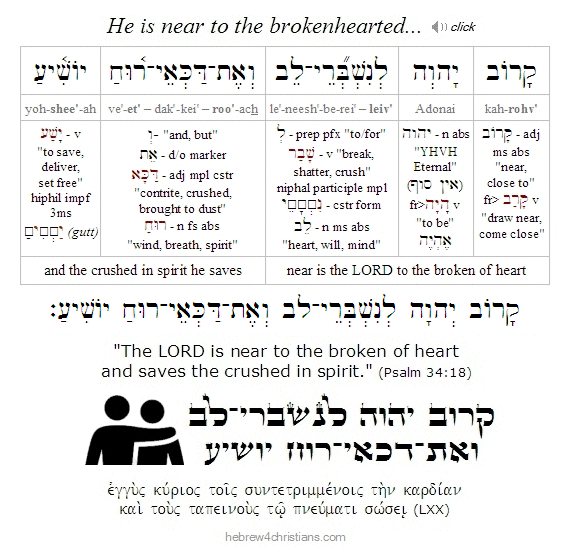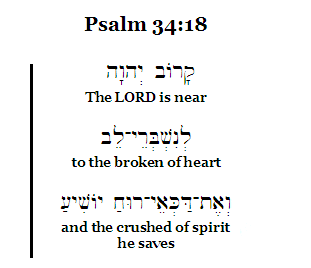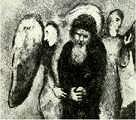|
"Abraham answered and said, "Behold, I have undertaken to speak to the Lord, I who am dust and ashes" (i.e., anokhi afar va'efer: וְאָנֹכִי עָפָר וָאֵפֶר, Gen. 18:27). This teaches that we cannot draw near to God apart from profound humility, since God's truth is revealed to the meek and lowly of heart but remains hidden from the proud (James 4:6). As it is written: "For this is what the high and lifted up One says, the One who abides forever, whose Name is Holy (קָדוֹשׁ): "I dwell in a high and holy place, but also with the broken and lowly of spirit, to revive the spirit of the lowly (i.e., ruach shefalim: רוּחַ שְׁפָלִים), and to revive the heart of the crushed" (i.e., lev nid'ka'im: לֵב נִדְכָּאִים) [Isa. 57:15]. Here we learn that God gives life (revives) to those who are "lowly in spirit" (שְׁפַל־רוּחַ), that is, to those who understand their own nothingness and complete dependence on Him for life...
Indeed, the "heart of the crushed" (לֵב נִדכֶּה) refers to being crushed "to the dust" -- the same word (dakka: דַּכָּא) is used to describe how Yeshua was "crushed for our iniquities" (see Isa. 53:10). William James called this deep work of the spiritual life "Zerrissenheit," a term that can be translated as "torn-to-pieces-hood," or a state of being utterly broken and in disarray... From the point of view of our dependence on God for salvation, "dakka" refers to humility and contrition we express in light of God's unmerited favor and love for our souls. We humbly identify with the death of Messiah offered on our behalf; we find healing and acceptance in the Presence of the One who was torn to pieces and made dust for our merit. Humility (עֲנָוָה) is essential to awareness of God in the truth. Shuvah Yisrael!
כִּי כה אָמַר רָם וְנִשָּׂא שׁכֵן עַד וְקָדוֹשׁ שְׁמוֹ
מָרוֹם וְקָדוֹשׁ אֶשְׁכּוֹן וְאֶת־דַּכָּא וּשְׁפַל־רוּחַ
לְהַחֲיוֹת רוּחַ שְׁפָלִים וּלְהַחֲיוֹת לֵב נִדְכָּאִים
kee · kho · a·mar · rahm · ve·nee·sa · sho·khen · ad · ve·ka·dohsh · she·moh
ma·rohm · ve·ka·dohsh · esh·kohn · ve·et · dak·ka - oosh·fahl · roo·ach
le·ha·cha·yoht · roo·ach · she·fa·leem · oo·le·ha·cha·yoht · lev · need·ka·eem

"For this is what the high and lifted up One says, the One who abides forever,
whose Name is Holy: "I dwell in a high and holy place, but also with the broken
and lowly of spirit, to revive the spirit of the lowly and to revive the heart of the crushed."
(Isa. 57:15)

Download Study Card
|





